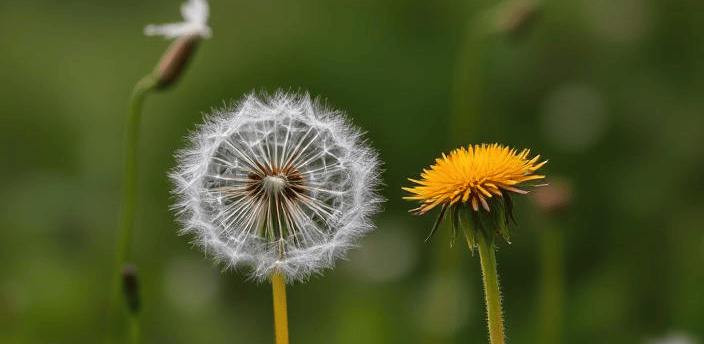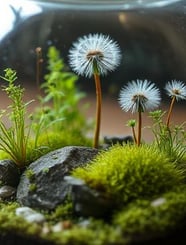The Dandelion
Uncovering Its Mystical Uses, History, and Significance
FLOWERS
Lily
2/23/20258 min read


Introduction to Dandelions
The dandelion, scientifically known as Taraxacum officinale, is a perennial herbaceous plant belonging to the Asteraceae family, more commonly known as the aster family. This plant is characterized by its bright yellow flowers and jagged, serrated leaves, which form a rosette close to the ground. The flowers are not only visually striking but also play a crucial role in the plant’s reproduction, attracting various pollinators such as bees and butterflies. Once matured, the flower heads transition into round, fluffy seed balls that disperse seeds over considerable distances, allowing the dandelion to thrive in various environments.
Dandelions typically flourish in temperate regions and are often found in fields, gardens, and along roadsides. Their resilience allows them to adapt to a range of soil types, and they often emerge in areas that have been disturbed. This widespread distribution contributes to their common perception as weeds, often viewed negatively by gardeners and homeowners alike. However, contrary to this perception, dandelions possess a multitude of beneficial properties that merit further exploration.
Historical Significance of Dandelions
The dandelion, boasts a profound historical significance that spans various cultures and time periods. Originating in Eurasia, this resilient plant quickly spread to other regions due to its adaptability and the practical applications presented to ancient civilizations. From the earliest records, dandelions were recognized not merely as weeds but as valuable assets for sustenance and healing.
In ancient China, dandelions were utilized for their medicinal properties, which were recorded in herbal texts as early as the 7th century. Traditional Chinese medicine revered the dandelion for its potential to detoxify the body, promote digestion, and alleviate various ailments. Similarly, in Europe, the Greeks and Romans incorporated dandelions into their diets, often consuming them in salads or as cooked greens. The leaves, roots, and flowers provided essential nutrients during the scarcity of winter.
Throughout history, dandelions have often appeared in folklore and mythology. They symbolized resilience and the power of the natural world, manifesting in stories that celebrated their persistence and beauty. Some cultures regarded these flowers as harbingers of spring, a time for renewal and new beginnings. Furthermore, various indigenous tribes recognized the significance of dandelions in their rituals, using the plant in ceremonies to honor the earth's bounty.
In contemporary herbalism, dandelions continue to hold a revered place, being celebrated for their diuretic properties and rich nutritional content. Both the root and leaves are commonly used in teas and tinctures, aiding in liver health and digestive support. By examining the historical significance of dandelions, we uncover the deep-rooted connections between these plants and the human experience across cultures, underlining their continued relevance in both traditional and modern contexts.
Dandelions in Herbal Medicine
Dandelions have long been celebrated in herbal medicine for their numerous medicinal properties. Various parts of the plant—aerial foliage, roots, and blossoms—are employed for an array of health benefits, making dandelions a rich resource for natural remedies. The leaves are often harvested for their high vitamin and mineral content, providing an excellent source of potassium and vitamins A, C, and K. As a diuretic, dandelion leaves aid in promoting urinary health and may assist in reducing bloating by encouraging the elimination of excess fluids from the body.
The roots of the dandelion are another valuable component, often utilized for their liver-supportive qualities. Traditionally, dandelion root is believed to promote detoxification, stimulate bile production, and enhance digestion by breaking down fats more efficiently. This quality can be beneficial following heavy meals or in cases of sluggish digestion. Additionally, recent studies suggest that dandelion root may have protective effects against oxidative stress, further underlining its role in holistic health practices.
The flowers of the dandelion, while less commonly used, are also noteworthy. They can be infused to create herbal teas or incorporated into topical applications. Rich in antioxidants, dandelion flowers can promote skin health by combating inflammation and aiding in the repair of damaged skin cells. Some herbalists recommend dandelion flower extracts for their potential to alleviate minor skin irritations and improve overall complexion.
Scientific research continues to explore the therapeutic potential of dandelions. While traditional uses have been documented through centuries of herbal wisdom, modern studies are beginning to validate these claims. For instance, recent investigations have highlighted the anti-inflammatory and anti-cancer properties of various dandelion constituents. Thus, dandelions embody a fascinating intersection of folklore and modern science, underscoring their valued place in herbal medicine.
Culinary Uses of Dandelions
Dandelions have long been recognized not only for their vibrant yellow flowers but also for their versatility in culinary applications. Every part of the dandelion plant is edible, from roots to flowers, making it a valuable resource for those interested in foraging and sustainable cooking. The young leaves, commonly referred to as "greens", are particularly popular in salads due to their slightly bitter flavor and crisp texture. When harvested early in the spring, these leaves can be used fresh in salads or sautéed lightly to temper their bitterness.
Dandelion flowers are also edible, and they can be used to make a delicious herbal tea. The flowers, when steeped in hot water, yield a pleasant, mildly floral beverage. Additionally, they can be incorporated into various dishes, such as fritters, where the petals are battered and fried, or infused into honey to create a unique sweetener. The roots of dandelions, when dried and roasted, can be brewed into a caffeine-free coffee substitute that has a rich, earthy flavor. This preparation not only provides a refreshing drink but also comes with various health benefits attributed to the root's properties.
From a nutritional perspective, dandelions are rich in vitamins A, C, and K, as well as several B vitamins. They also provide significant amounts of minerals such as calcium, potassium, and iron, making them a beneficial addition to any diet. Their high levels of antioxidants contribute to a number of health advantages, including improved digestion and reduced inflammation. Whether enjoyed raw, cooked, or prepared as a beverage, dandelions serve as a sustainable and nutritious choice for health-conscious individuals.
In conclusion, the culinary possibilities of dandelions are abundant. As interest in wild edibles continues to rise, incorporating this plant into your diet opens up exciting avenues for flavor and nutrition.
Dandelions and Witchcraft: A Symbol of Magic
Dandelions hold a notable place in the realm of witchcraft and magical practices. Historically, these resilient plants have been perceived as potent symbols of magic, embodying various beliefs and rituals across numerous cultures. Their bright yellow blooms and unique seed heads have made them a focal point in both herbalism and the mystical arts.
In witchcraft, dandelions have been associated with the sun, representing health, prosperity, and wish fulfillment. The plant's lifecycle, from bloom to puff ball, has been interpreted as a metaphor for transformation and the continuation of life. Witches have traditionally utilized dandelions in spell work aimed at invoking strength and protection. For instance, dandelion roots can be brewed into teas or tinctures, believed to enhance psychic abilities and aid in divination practices. This makes dandelions not just a common weed, but a vessel for magical potential.
Cultural beliefs surrounding dandelions also emphasize the significance of their seeds. The act of blowing on a dandelion puff to make a wish is a common practice, reflecting the age-old association between the plant and the manifestation of hopes and dreams. This simple ritual demonstrates the connection between nature and magic, underscoring the idea that dandelions serve as a bridge between the physical and spiritual realms.
Additionally, the symbolism of dandelions has extended to themes of resilience and adaptability. Their ability to thrive in diverse environments mirrors the strength often sought in witchcraft. As such, the dandelion stands as a poignant reminder that magic is not solely found in the rare and the ethereal, but also in the commonplace, reflecting the rich tapestry of witchcraft traditions that have embraced this remarkable plant over centuries.
Dandelion Folklore and Superstitions
The dandelion, with its bright yellow blooms and whimsical seed heads, has been a subject of fascination in various cultures for centuries. This herbaceous perennial is often viewed as a symbol of resilience and adaptability, thriving in diverse environments. Across different societies, dandelions have been intertwined with a rich tapestry of folklore and superstitions that reveal their significance beyond mere botany.
In many cultures, dandelions are associated with good fortune. For instance, blowing the seeds off a dandelion puff is often regarded as a way to make wishes. It was believed that if the seeds dispersed in the wind, one’s dreams would soar alongside them, paving the way for those wishes to come true. The number of seeds remaining attached was sometimes thought to indicate the number of months until the wish would manifest, making it a charming ritual among children and adults alike.
Beyond luck, dandelions are also linked to love and fidelity in various traditions. In some cultures, the flower's vibrant yellow color is seen as a representation of the sun and joy, symbolizing the warmth of love. Young lovers would collect dandelions to give as tokens of affection, emphasizing their desire for a blooming romance as bright as the flower itself. Conversely, certain superstitions caution against dandelion use in love spells, warning that seeking affection through manipulation could lead to unwanted consequences.
In addition to positive associations, dandelions are sometimes surrounded by taboos. Some cultures believed that harvesting dandelions on specific days or during certain lunar phases could bring misfortune. This belief stems from the plant's powerful connection to the spirit world, as it was thought that disturbing it might upset the spirits residing within the plant. These varied beliefs underscore the importance of the dandelion in cultural narratives and its profound role in the human psyche, navigating between luck, love, and caution.
Conclusion: The Resilience of Dandelions
The dandelion, often perceived merely as a persistent weed, holds an extensive array of uses that span both historical and contemporary contexts. This humble plant has showcased its resilience, thriving in diverse environments while offering a multitude of benefits to both humans and ecosystems. Dandelions have been utilized in various forms: from herbal remedies and culinary delights to their role in promoting biodiversity and supporting pollinators. Their significance in traditional medicine, particularly in cultures that have long embraced natural healing practices, further underscores their value as a resource.
Historically, dandelions have not only been recognized for their practical applications but also for their symbolism of perseverance and adaptability. They represent an enduring spirit that persists against challenges, reflecting the ability to flourish in unexpected circumstances. This resilience is evident in their ability to grow in a wide range of soils and climates, making them a testament to nature's ingenuity. They have transitioned from overlooked flora to noteworthy components of numerous ecosystems, showcasing their essential role in maintaining soil health and nurturing wildlife.
As we develop a greater appreciation for the dandelion, it is crucial to recognize its multifaceted contributions. Encouraging the integration of dandelions into our gardens and diets can enrich our lives and promote sustainable practices. By embracing their advantages, we honor their historical significance and gain access to their potential benefits. The vibrant yellow flowers and versatile leaves of dandelions serve as a reminder of the beauty and utility found in nature’s simplest creations. In summary, let us cultivate awareness and gratitude for the dandelion, welcoming it into our lives as an invaluable ally rather than a mere weed.


LINKS
Seed Needs Dandelion Seeds for Planting - Non-GMO, Heirloom & Untreated Perennial Herbs - Organically Grow Food for Tortoises, Rabbits & Bearded Dragons (2 Packs)
As an Amazon Associate I earn from qualifying purchases.
Outsidepride Dandelion Seeds for Planting - 5,000 Seeds Perennial, Easy to Grow & Drought Tolerant, Taraxacum Officinale Herb Seeds with Yellow Blooms for Edible Landscaping & Wildlife Attraction
As an Amazon Associate I earn from qualifying purchases.
Traditional Medicinals Organic Dandelion Leaf & Root Herbal Tea, Supports Kidney Function & Healthy Digestion, (Pack of 3) - 48 Tea Bags Total
As an Amazon Associate I earn from qualifying purchases.
Yogi Tea Roasted Dandelion Spice DeTox Tea - 16 Tea Bags per Pack (6 Packs) - Organic DeTox Tea - Includes Roasted Dandelion Root, Dandelion Root, Cinnamon Bark, Cocoa Shell & More
As an Amazon Associate I earn from qualifying purchases.
FullChea - Dandelion Leaf & Root Tea bags, 50 Teabags - Natural Dandelion Herbal Tea for Liver & Kidney Health - Non-GMO - Caffeine-free - Support Digestion & Boost Immune System
As an Amazon Associate I earn from qualifying purchases.
FGO Organic Dandelion Root Loose Tea, Cut and Sifted, Caffeine Free, 16oz Bulk Resealable Bag, Packaging May Vary (Pack of 1)
As an Amazon Associate I earn from qualifying purchases.
Zazzee USDA Organic Dandelion Root 10:1 Extract, 3000 mg Strength, 120 Capsules, 4 Month Supply, Standardized and Concentrated 10X Extract, 100% Vegetarian, All-Natural and Non-GMO
As an Amazon Associate I earn from qualifying purchases.
XPRS Nutra Organic Dandelion Root Powder - Vegan Friendly Antioxidant Power for Liver Support - Dandelion Root for Tea and Beverages - Immune Boosting Dandelion Powder (8 Ounce)
As an Amazon Associate I earn from qualifying purchases.
Magick
Explore the enchanting realm of Witchcraft today.
©Lilyopatra 2025. All rights reserved.
All SALES ARE FINAL, and we appreciate your understanding of our site policy. Once a purchase is made, we cannot offer refunds or exchanges for any items. This policy ensures that we can maintain low prices and high-quality products for our customers. We encourage you to thoroughly review product descriptions, sizes, and specifications before completing your purchase to avoid any dissatisfaction. If you have any questions about an item, please reach out to our customer service team prior to ordering. We value your business and are committed to providing a positive shopping experience, but once a transaction is finalized, we are unable to accommodate any changes or returns.
Thank you for your cooperation and support.



